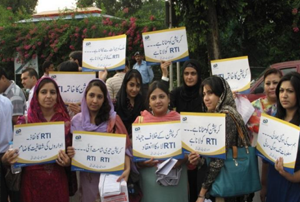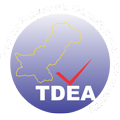For a democratic setup to flourish, it requires public participation as much as it needs other bolstering factors. Keeping public office holders involved not only ensures a transparent and accountable state but it also yields a sense of belonging into the hearts of citizens. This, however, is only possible if free flow of information prevails between state institutions and citizens. November 1, 2013 will be remembered as a historic day, asr on this day the Khyber Pakhtunkhwa Assembly approved “Right to Information Act 2013” and guaranteed citizen’s right to information (RTI) in the light of Article 19-A of the Constitution of Pakistan. With this, a remarkable struggle of Center for Peace and Development Initiatives (CPDI) finally bore fruit.

CPDI, working for transparency and accountability under USAID-funded Citizens’ Voice Project, has been the prime advocator on right to information. It has been a commendable journey, during which CPDI not only raised awareness, engaged senior political leaders and legislators, intervened during critical law-making phases, and launched a vigorous social media campaign. CPDI also presented a comprehensive draft bill on the right to information to the newly elected Khyber Pukhtunkhwa government.
CPDI, working for transparency and accountability under USAID funded Citizens’ Voice Project, has been the prime advocator on Right to Information. It has been a commendable journey, during which CPDI raised awareness, engaged senior political leaders and legislators, intervened during critical law-making phases, and launched a vigorous social media campaign. CPDI also presented a comprehensive draft bill on Right to Information to the newly elected Khyber Pakhtunkhwa government.
It was challenging to encounter forces which never wanted to allow public access to information. In June 2013, KP Cabinet approved an ineffective RTI draft. This led CPDI to call a press conference on July 24, 2013 in Peshawar, rejecting the KP Cabinet’s approved RTI draft. As a consequence, the tempered RTI draft was supervened on August 13, 2013 with a much better draft which was later promulgated as the RTI ordinance. Acknowledging CPDI’s contribution, Mr Zahid Abdullah was invited by the KP chaired by Chairman Pakistan Tehreek-e-Insaf, Imran Khan on August 18, 2013 at Peshawar.
The story does not end here, CPDI successfully resisted when certain members of the Select Committee of KP Assembly suggested regressive amendments to the draft during the enactment process. Right to Information Act 2013 was approved on November 1, 2013 by the Khyber Pakhtunkhwa Assembly, a law which is regarded as one of the best laws in the world by the Center for Law and Democracy, a prestigious, Canadian-based research entity, at Right to Information launching ceremony.
And it starts, on January 8, 2014. Zahid Abdullah, a staff member of CPDI, submitted a number of RTI requests and has obtained information from multiple provincial departments under the RTI law. What is truly excellent about the law is that public office holders are now liable to provide requested information to the requestor and the process of filing information requests is easy and cost effective. There is no fee for filing information request and only the actual cost of reproducing and sending it to the applicant will be charged. In order to highlight qualitative aspects of RTI law, CPDI organized a media conference on February 4, 2014 which was attended by provincial political leaders, including the Health Minister, media personnel, and Mr. Sahibzada Muhammad Khalid, first ever Chief Information Commissioner appointed on December 6, 2013. CPDI is currently engaged in training Right to Information activists, advocating for effective implementation of the law, and spreading awareness.





















